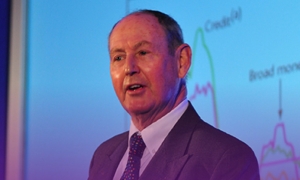Chris Potter
Video calling is almost always the first step of any interview process. It may sound obvious, but it's amazing how differently people can treat a video call/interview to a face-to-face interview. Follow these best practices to make the most of your chance when engaging with your potential new team:
Make sure you are presentable
Ditch the home clothes and make sure that you dress up in the same fashion that you would have dressed for a face-to-face interview. A first impression here is just as important as it would be if you were meeting in person, but it's also proven to get you in the right mental state to perform at your best.
Don't set up in your laundry room (or anywhere messy)
Okay, I know you probably won't set yourself up in the laundry room, but this is important. Make sure that the surrounding area - the room that you're in - is tidy and kept free from any unnecessary props.
Cafes are great for working in... but not great for an interview.
Avoid anywhere that has noise if possible. Think about the environment you'll be video interviewing in. Choosing an inappropriate environment says a lot about how serious you are about making the right impression.
"I can hear you, can you hear me?"
I've started a video call saying (and seeing someone say) those words on more than one occasion and it's such a frustrating way to start a call. It just kicks everything off on the wrong foot. Don't get me wrong, it's not the end of the world and the call can definitely be brought back from that awkward start, but why take the risk? Check your audio settings. Make sure your 'Output' settings are mid-to-high and that your 'Input' settings are low-to-mid (to limit outside sound). Also, whether you are using the speakers and mic on your computer or headset, make sure they are connected properly. Check it once, test it with a friend, and you'll be off to a smooth start.
'Hello? You've frozen again...'
That leads nicely onto my next big frustration - internet connection. If you know that your internet at home is a little dodgy then go somewhere where it's not. It only takes two or three interrupted connections before both sides start feeling exasperated.
Where are you looking?
When you're sitting in front of a person on a screen in a room, it's sometimes easy to forget the face-to-face etiquette. It's easy to start looking to the side when you're thinking, or distracting yourself when they're talking, particularly when they aren't focusing on the screen either! But don't fall into that trap. Look at the screen, as if you're keeping eye contact, or look into the camera. Just make sure your gaze is focused.
DON'T FORGET THE PHONE
The phone is still an important bit of kit and you'll find that first stage interviews, or even final confirmations, might be done over the phone. A lot of the rules from above actually apply to the phone as well: get dressed up (you'll feel sharper), stay away from noisy places, and go somewhere you know has good signal. But there is another golden rule:
Get across your enthusiasm
A video call can bridge the gap between that and a face-to-face interview, as you can still show your enthusiasm with on-screen demeanour, but that's a little harder to get across on the phone. Some people can be genuinely excited and interested in an opportunity, but without seeing them you'd never know. It's easy for your voice to get a little flat and monotone, especially if you've been talking a lot when answering questions. Be mindful of this. Try a little harder to get across your enthusiasm and positive energy at the exciting opportunity you have in front of you.
FPGA Engineer Salaries - September 2024 - UK
Are you curious about the current salary trends for FPGA Engineers in the UK? Whether you're an employee checking if your earnings are on par with industry standards or an employer aiming to offer competitive salaries, our detailed salary survey provides the insights you need. Explore the comprehensive breakdown of salary ranges across various regions below.
Midlands:
Junior: £35,000 - £50,000 | Mid-Level: £45,000 - £65,000 | Senior: £60,000 - £80,000 | Lead: £75,000 - £100,000
North East:
Junior: £33,000 - £45,000 | Mid-Level: £40,000 - £60,000 | Senior: £55,000 - £75,000 | Lead: £70,000 - £95,000
North West:
Junior: £33,000 - £45,000 | Mid-Level: £40,000 - £60,000 | Senior: £55,000 - £75,000 | Lead: £70,000 - £95,000
Scotland:
Junior: £33,000 - £45,000 | Mid-Level: £40,000 - £60,000 | Senior: £55,000 - £75,000 | Lead: £70,000 - £95,000
Wales:
Junior: £33,000 - £45,000 | Mid-Level: £40,000 - £60,000 | Senior: £55,000 - £75,000 | Lead: £70,000 - £95,000
South East:
Junior: £37,000 - £55,000 | Mid-Level: £47,000 - £70,000 | Senior: £65,000 - £85,000 | Lead: £80,000 - £110,000
South West:
Junior: £35,000 - £50,000 | Mid-Level: £55,000 | Senior: £70,000 | Lead: £87,500
East Anglia:
Junior: £35,000 - £50,000 | Mid-Level: £45,000 - £65,000 | Senior: £60,000 - £80,000 | Lead: £75,000 - £100,000
Yorkshire:
Junior: £33,000 - £45,000 | Mid-Level: £40,000 - £60,000 | Senior: £55,000 - £75,000 | Lead: £70,000 - £95,000
London:
Junior: £40,000 - £60,000 | Mid-Level: £50,000 - £75,000 | Senior: £70,000 - £95,000 | Lead: £90,000 - £120,000
Is it a match?
Is your existing salary aligned with the standards for your job position? Are you an employer concerned about competitive salaries and what you should be paying? Let us help!
If you're interested in exploring new career options,please submit your CV. Alternatively, if you need support with recruitment, or would like free salary benchmarking across the entire business,submit a vacancy or give us a call!
Please note, these salaries are based on estimation, if you would like a more accurate salary for your business, please get in touch!
Are you curious about the current salary trends for Antenna Design Engineers in the UK? Whether you're an employee checking if your earnings are on par with industry standards or an employer aiming to offer competitive salaries, our detailed salary survey provides the insights you need. Explore the comprehensive breakdown of salary ranges across various regions below.
Midlands:
Junior: £42,500 | Mid-Level: £55,000 | Senior: £70,000 | Lead: £87,500
North East:
Junior: £39,000 | Mid-Level: £50,000 | Senior: £65,000 | Lead: £82,500
North West:
Junior: £39,000 | Mid-Level: £50,000 | Senior: £65,000 | Lead: £82,500
Scotland:
Junior: £39,000 | Mid-Level: £50,000 | Senior: £65,000 | Lead: £82,500
Wales:
Junior: £39,000 | Mid-Level: £50,000 | Senior: £65,000 | Lead: £82,500
South East:
Junior: £46,000 | Mid-Level: £58,500 | Senior: £75,000 | Lead: £95,000
South West:
Junior: £42,500 | Mid-Level: £55,000 | Senior: £70,000 | Lead: £87,500
East Anglia:
Junior: £42,500 | Mid-Level: £55,000 | Senior: £70,000 | Lead: £87,500
Yorkshire:
Junior: £39,000 | Mid-Level: £50,000 | Senior: £65,000 | Lead: £82,500
London:
Junior: £50,000 | Mid-Level: £62,500 | Senior: £82,500 | Lead: £105,000
Is it a match?
Is your existing salary aligned with the standards for your job position? Are you an employer concerned about competitive salaries and what you should be paying? Let us help!
If you're interested in exploring new career options, please submit your CV. Alternatively, if you need support with recruitment, or would like free salary benchmarking across the entire business, submit a vacancy or give us a call!
Please note, these salaries are based on estimation, if you would like a more accurate salary for your business, please get in touch!
7
6
5
Octavia Wright
With three years at Enterprise Recruitment, I lead marketing initiatives to enhance brand visibility and engagement. I create content for social media, execute targeted email campaigns, organize and produce webinars, and coordinate events that support our growth and industry presence.
On the administrative side, I ensure the office runs efficiently, allowing the team to focus on what they do best—filling roles and driving success. My work blends innovative marketing strategies with seamless support to help drive the company’s continued success.
I also work closely with client accounts teams to ensure accuracy and efficiency in all financial processes. Internally, I manage various financial tasks, including invoicing and contractor coordination.
Jamie Harris
With over 25 years of recruitment experience and a background that includes a BSc in Computer Science and hands-on roles in manufacturing and telecoms, I bring a unique perspective to technical recruitment. As the Director of Enterprise Recruitment Ltd, I specialize in connecting top-tier engineering talent with innovative companies in the electronics and engineering sectors.
With years of experience navigating the dynamic technical recruitment landscape, I have developed a keen understanding of the challenges businesses face in sourcing top engineering talent and the complexities candidates encounter in securing their dream roles. My expertise lies in bridging these gaps by delivering tailored recruitment strategies that align with business goals and career aspirations.
I’m particularly passionate about helping businesses build dream teams and empowering candidates to achieve their dream jobs. Whether through strategic recruitment processes, market insights, or thought leadership, my goal is to leave a lasting impact on the technical recruitment space.
Call me anytime for recruitment advice—I’m always happy to help!
Kit Element
I've been in the recruitment world for over 10 years, and since 2021, I've been part of the Enterprise team, specializing in the software and electronics sector. I enjoy helping talented engineers find the roles that fit them best, and I've had the pleasure of working with a wide range of candidates. Whether it’s matching skill sets with the perfect company or guiding candidates through the hiring process, I’m here to make the recruitment experience as smooth and successful as possible.
We were delighted to host a roundtable webinar featuring Roger Martin-Fagg, a renowned Behavioural Economist, to explore the economic outlook within the technology sector.
Roger brought his unique and informed perspective, offering valuable insights into what the future may hold for the industry.
About Roger Martin-Fagg
Roger began his career as an Economist with the New Zealand Treasury before moving to Henley Management College, where he designed, delivered, and taught bespoke strategic management programs.
For the past seven years, Roger has worked as an Independent Behavioural Economist. He also contributes his expertise to leading institutions such as Warwick, Ashridge, Henley, and Duke Business Schools, as well as the Bank of England and the Institute of Marketing. Additionally, he has served as an External Examiner at the University of Bath.
Roger specializes in making economics accessible to non-economists and helping boards navigate their strategic decision-making.
Key Takeaways from the Webinar
The session provided an insightful look at the technology sector’s economic future, with Roger’s predictions already proving accurate in the evolving economic landscape.










